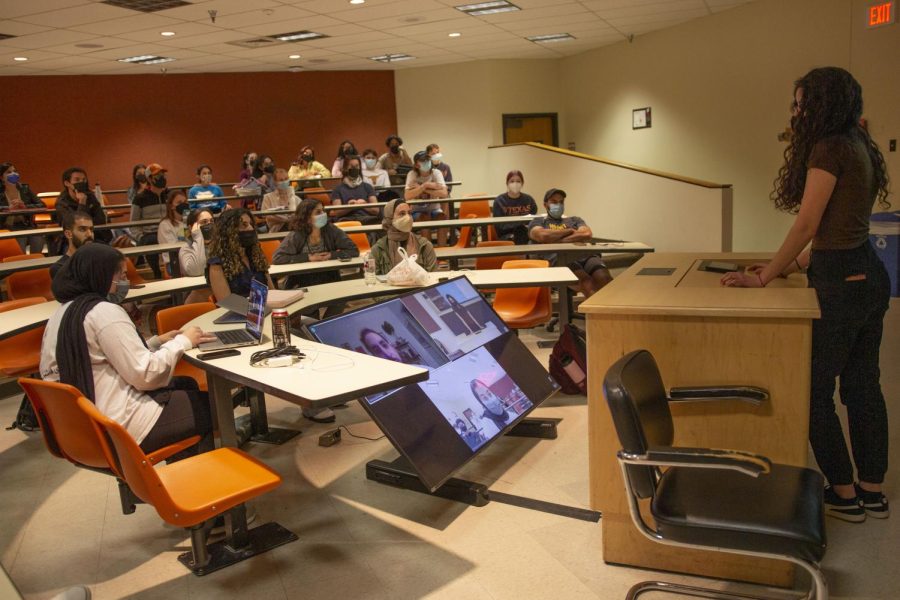Palestinian Solidarity Committee releases response to University halting legislation about definition of antisemitism
March 22, 2022
Editor’s Note: This article first appeared in the March 11, 2022 flipbook. This story was updated on March 22 with new information obtained by the Texan through a public information request about emails sent to the dean of students from the executive director of Texas Hillel.
The Palestinian Solidarity Committee released a joint statement March 8 condemning the University after they deemed legislation affirming the rights of Palestinian advocates as a non-University issue.
The joint statement, signed by 16 student organizations, came after a Feb. 20 email from the Dean of Students informing leaders of Legislative Student Organizations that their legislation was a non-University issue. As such, the legislation could not use the University logo or official organization names, including Student Government, Senate of College Councils and the Graduate Student Assembly, that would indicate University affiliation, according to an email from Doug Garrard, associate vice president of campus life and deputy Dean of Students.
Maiya Edelson, executive director of the Jewish student life center Texas Hillel, sent an email to Dean of Students Soncia Reagins-Lilly and Garrard on Feb. 11 that informed them of the resolution and suggested they take action against it, according to a copy of the email obtained by The Daily Texan through a public information request.
“The nature of the resolution — and the ‘optics’ of revoking an antisemitism bill/definition in the current climate and a few weeks after the synagogue attack in Coleyville — are tough,” Edelson said in the email. “I just wanted to flag this to the two of you so that you’re aware that it’s ‘out there.’”
Garrard said the office was already talking to “student leaders” about the resolution in an email response to Edelson on Feb. 13. Edelson did not respond to requests to comment before publication.
The joint resolution’s status as a University issue was determined by University rules, not outside input, said Sara Kennedy, director of strategic and executive communications, in an email. She said Regent’s Rule 50203 outlines procedures for Student Government speaking about non-university issues, but declined to comment on why the PSC legislation is a non-university issue.
Because of the University’s conditions, the Palestinian Solidarity Committee decided not to introduce the legislation to any of the LSO’s, said Jenna Homsi, a member of the committee.
“The issue is they’re having to give us these conditions in the first place, and they are silencing what we had originally wanted to say,” said psychology junior Homsi.
The joint resolution sought to repeal the International Holocaust Remembrance Alliance’s definition of antisemitism from campus because a clause in the definition states that criticizing Israel is antisemitic. Student Government adopted the IHRA definition of antisemitism in March 2021. Palestinian advocates say they are worried this would infringe upon their rights to free speech during any demonstrations they hold protesting the occupation of Palestine.
Some Jewish students say they worry that repealing the definition will lead to poor University response to antisemitic attacks on campus.
“The current definition we have in place is good protection for antisemitism,” said Zachary Denn, McCombs representative for Student Government. “If it gets stripped away, I’m just scared to see the outcomes and what’s going to be allowed on the campus.”
The University declined to provide comment clarifying why the PSC legislation is not a University issue.
PSC member Nura Bawab said because this legislation was in response to legislation passed by Student Government adopting the IHRA definition of antisemitism, it is a University issue.
“I don’t think that we as Palestinians, as PSC, have to wait for … repercussions to happen in order to say something,” said Bawab, a fifth-year advertising and textiles and apparel major. “We’re seeing this as clear censorship and a clear double standard from the University.”
Walker Adams, LBJ School of Public Affairs representative for Student Government, said the University’s decision disappointed him because of what it could mean for student advocates moving forward.
“The University administration’s unprecedented interference restricts student sovereignty and prevents us from even attempting to discuss these critical issues,” Adams, a public affairs graduate student, said in an email.
PSC member Haya Saidi said all students should fight against censorship on campus.
“It is something that affects all of us as students and shows the University has the ability to interfere in student issues that do not concern them,” undeclared freshman Saidi said. “We can’t allow them to censor us and to prevent us from speaking on issues that matter to us.”



